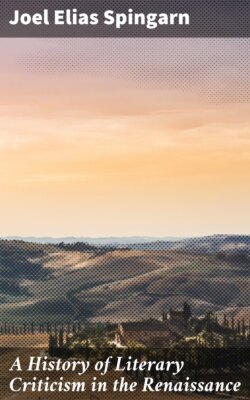Читать книгу A History of Literary Criticism in the Renaissance - Joel Elias Spingarn - Страница 13
На сайте Литреса книга снята с продажи.
I. Poetry as a Form of Scholastic Philosophy
ОглавлениеIn the first place, poetry is a form of philosophy. Savonarola had classed poetry with logic and grammar, and had asserted that a knowledge of logic is essential to the composing of poetry. The division of the sciences and the relative importance of each were a source of infinite scholastic discussion during the Middle Ages. Aristotle had first placed dialectic or logic, rhetoric, and poetics in the same category of efficient philosophy. But Averroës was probably the first to confuse the function of poetics with that of logic, and to make the former a subdivision, or form, of the latter; and this classification appears to have been accepted by the scholastic philosophers of the Middle Ages.
This conception of the position of poetry in the body of human knowledge may be found, however, throughout the Renaissance. Thus, Robortelli, in his commentary on Aristotle's Poetics (1548), gives the usual scholastic distinctions between the various forms of the written or spoken word (oratio): the demonstrative, which deals with the true; the dialectic, which deals with the probable; the rhetorical, with the persuasive; and the poetic, with the false or fabulous.[40] By the term "false" or "fabulous" is meant merely that the subject of poetry is not actual fact, but that it deals with things as they ought to be, rather than as they are. Varchi, in his public lectures on poetry (1553), divides philosophy into two forms, real and rational. Real philosophy deals with things, and includes metaphysics, ethics, physics, geometry, and the like; while rational philosophy, which includes logic, dialectic, rhetoric, history, poetry, and grammar, deals not with things, but with words, and is not philosophy proper, but the instrument of philosophy. Poetry is therefore, strictly speaking, neither an art nor a science, but an instrument or faculty; and it is only an art in the sense that it has been reduced to rules and precepts. It is, in fact, a form of logic, and no man, according to Varchi, can be a poet unless he is a logician; the better logician he is, the better poet he will be. Logic and poetry differ, however, in their matter and their instruments; for the subject of logic is truth, arrived at by means of the demonstrative syllogism, while the subject of poetry is fiction or invention, arrived at by means of that form of the syllogism known as the example. Here the enthymeme, or example, which Aristotle has made the instrument of rhetoric, becomes the instrument of poetry.
This classification survived in the Aristotelian schools at Padua and elsewhere as late as Zabarella and Campanella. Zabarella, a professor of logic and later of philosophy at Padua from 1564 to 1589, explains at length Averroës's theory that poetics is a form of logic, in a treatise on the nature of logic, published in 1578.[41] He concludes that the two faculties, logic and poetics, are not instruments of philosophy in general, but only of a part of it, for they refer rather to action than to knowledge; that is, they come under Aristotle's category of efficient philosophy. They are not the instruments of useful art or of moral philosophy, the end of which is to make one's self good; but of civil philosophy, the end of which is to make others good. If it be objected that they are τῶν ἐναντίων, that is, of both good and evil, it may be answered that their proper end is good. Thus, in the Symposium, the true poet is praised; while in the Republic the poets who aim at pleasure and who corrupt their audiences are censured; and Aristotle in his definition of tragedy says that the end of tragedy is to purge the passions and to correct the morals of men (affectiones animi purgare et mores corrigere).
Even later than Zabarella, we find in the Poetica of Campanella a division of the sciences very similar to that of Savonarola and Varchi. Theology is there placed at the head of all knowledge, in accordance with the mediæval tradition, while poetics, with dialectic, grammar, and rhetoric, is placed among the logical sciences. Considering poetica as a form of philosophy, another commentator on Aristotle, Maggi (1550), takes great pains to distinguish its various manifestations. Poetica is the art of composing poetry, poesis, the poetry composed according to this art, poeta, the composer of poetry, and poema, a single specimen of poetry.[42] This distinction is an elaboration of two passages in Plutarch and Aphthonius.
